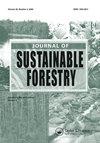Analysis of the synergistic mechanism of forest eco-economic system
IF 1.8
4区 农林科学
Q3 FORESTRY
引用次数: 0
Abstract
Based on the collective forest with common use rights, the social-ecological system analysis framework and autonomous governance theory proposed by Elinor Ostrom are introduced in the forest eco-economic system to analyze the interaction logic among the first-level subsystems and the secondary variables of the forest eco-economic system and the variables related to the autonomous governance of the system to explore the synergistic mechanisms affecting the forest eco-economic system. The results show that: in the case of information asymmetry, collective actions of governmental and non-governmental organizations will aggravate the dilemma of forest eco-economic synergistic development; actors extract forest resource units from the forest resource system to achieve economic benefits; and renewable resources of forest ecosystems can be sustained in the long term when the average extraction rate of humans from forest ecosystems does not exceed the average replenishment rate.森林生态经济系统协同机制分析
以集体共有使用权森林为基础,在森林生态经济系统中引入埃莉诺·奥斯特罗姆(Elinor Ostrom)提出的社会生态系统分析框架和自治治理理论,分析森林生态经济系统的一级子系统和二级变量与系统自治治理相关变量之间的交互逻辑,探索影响森林生态经济系统的协同机制。结果表明:在信息不对称的情况下,政府和非政府组织的集体行动将加剧森林生态经济协同发展的困境;行动者从森林资源系统中提取森林资源单位,实现经济效益;当人类对森林生态系统的平均采取率不超过平均补充率时,森林生态系统的可再生资源可以长期持续。
本文章由计算机程序翻译,如有差异,请以英文原文为准。
求助全文
约1分钟内获得全文
求助全文
来源期刊

Journal of Sustainable Forestry
Social Sciences-Geography, Planning and Development
CiteScore
3.90
自引率
12.50%
发文量
42
期刊介绍:
Journal of Sustainable Forestry publishes peer-reviewed, original research on forest science. While the emphasis is on sustainable use of forest products and services, the journal covers a wide range of topics from the underlying biology and ecology of forests to the social, economic and policy aspects of forestry. Short communications and review papers that provide a clear theoretical, conceptual or methodological contribution to the existing literature are also included in the journal.
Common topics covered in the Journal of Sustainable Forestry include:
• Ecology, management, recreation, restoration and silvicultural systems of all forest types, including urban forests
• All aspects of forest biology, including ecophysiology, entomology, pathology, genetics, tree breeding, and biotechnology
• Wood properties, forest biomass, bioenergy, and carbon sequestration
• Simulation modeling, inventory, quantitative methods, and remote sensing
• Environmental pollution, fire and climate change impacts, and adaptation and mitigation in forests
• Forest engineering, economics, human dimensions, natural resource policy, and planning
Journal of Sustainable Forestry provides an international forum for dialogue between research scientists, forest managers, economists and policy and decision makers who share the common vision of the sustainable use of natural resources.
 求助内容:
求助内容: 应助结果提醒方式:
应助结果提醒方式:


